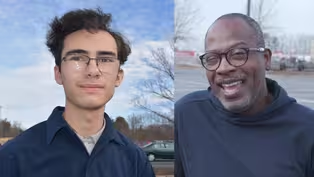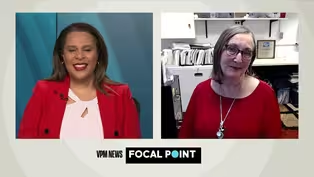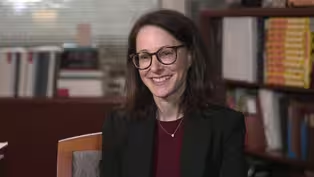VPM News Focal Point
Facial Recognition Technology
Clip: Season 2 Episode 2 | 4m 15sVideo has Closed Captions
A new Virginia law puts guardrails on the 21st century tech, but some say it’s not enough.
Your face is one of your most recognizable features, but a new Virginia law allows law enforcement to use facial recognition technology to track down suspects. Lawmakers hope the regulations will provide guardrails, but privacy advocates warn the 21st century tech may have a negative impact on minority communities.
Problems playing video? | Closed Captioning Feedback
Problems playing video? | Closed Captioning Feedback
VPM News Focal Point is a local public television program presented by VPM
The Estate of Mrs. Ann Lee Saunders Brown
VPM News Focal Point
Facial Recognition Technology
Clip: Season 2 Episode 2 | 4m 15sVideo has Closed Captions
Your face is one of your most recognizable features, but a new Virginia law allows law enforcement to use facial recognition technology to track down suspects. Lawmakers hope the regulations will provide guardrails, but privacy advocates warn the 21st century tech may have a negative impact on minority communities.
Problems playing video? | Closed Captioning Feedback
How to Watch VPM News Focal Point
VPM News Focal Point is available to stream on pbs.org and the free PBS App, available on iPhone, Apple TV, Android TV, Android smartphones, Amazon Fire TV, Amazon Fire Tablet, Roku, Samsung Smart TV, and Vizio.
Providing Support for PBS.org
Learn Moreabout PBS online sponsorshipADRIENNE MCGIBBON: It is everywhere.
You use it to open your phone and to tag friends on social media.
It's even cropping up going through airport security.
Facial recognition technology has been around for decades, and in Virginia, it's become a tool of 21st century policing.
SCOTT SUROVELL: So, it's out there and being used right now commercially in a lot of ways, but when the government wants to use it to lock people up in jail or to create consequences for it, that's when we have to have some really tight standards on it to make sure it's used properly.
ADRIENNE MCGIBBON: In 2022, Virginia passed a law putting guardrails on police use of facial recognition.
The high-tech tool is an algorithm that compares facial images and determines if there they're a possible match.
Senator Scott Surovell, a defense attorney who represents Fairfax County, introduced the bill which passed with bipartisan support.
SCOTT SUROVELL: In Virginia, we basically had zero standards on facial recognition technology.
ADRIENNE MCGIBBON: The law sets out 14 instances when police are permitted to use the technology, including identifying a suspect in a crime, a victim, or a missing person.
The law requires any facial recognition software used in Virginia must receive at least a 98% accuracy rate from the National Institute of Standards and Technology.
But some critics say these restrictions aren't enough.
ALISON POWERS: As I looked more into it, I became more increasingly concerned about its effect on police investigations, our clients specifically.
ADRIENNE MCGIBBON: Alison Powers is the director of policy at the Virginia Indigent Defense Commission; an agency that oversees the state's public defenders.
Powers says the restrictions are too broad.
ALISON POWERS: It will sweep up clients of color, clients who are indigent, and people who typically are involved in property crimes and low level offenses; the things that are typically captured on video.
ADRIENNE MCGIBBON: Historically, facial recognition technology has disproportionately misidentified people with darker skin pigmentation.
Virginia's law attempts to address this disparity, but Powers says the accuracy testing doesn't hold up in the real world.
ALISON POWERS: Many algorithms get very high marks when you're comparing a mugshot photo to another mugshot photo.
The algorithms can perform very well on those.
When you change one of those photos to a more blurry photo like a kiosk photo, a surveillance photo, the accuracy levels drop significantly.
ADRIENNE MCGIBBON: There are no known cases in Virginia of police misidentifying a suspect with facial recognition.
But in the US, over the past few years, there have been at least four instances when police improperly charged black men after using the tool.
TRICIA POWERS: The algorithms have come a long way through the years.
They're much more accurate than they used to be, but they're not there yet.
ADRIENNE MCGIBBON: Virginia State Police has been using facial recognition for more than a decade.
It runs comparison photos through a database compiled entirely of mugshots.
(car cruising by) Colonel Tricia Powers, who oversees VSP's use of facial recognition, says this technology should just be part of an investigation.
TRICIA POWERS: It's not designed to be an exact match like a fingerprint is an exact match for an individual.
ADRIENNE MCGIBBON: Colonel Powers says problems can arise when police don't understand the technology.
TRICIA POWERS: You know, sometimes, enforcement action was taken when it shouldn't have been.
ADRIENNE MCGIBBON: While Attorney Alison Powers says databases like the state police's are the best option, she worries about the implications if the technology becomes more widespread.
ALISON POWERS: We'll gather more data and stories of how the technology itself is flawed because it's human made.
SCOTT SUROVELL: There's pluses and minuses to all these types of technologies, and what's important is that we have clear standards so that, you know, people just can't use 'em whenever and however they feel like using 'em, which is what this bill does.
Digital Privacy | People of Virginia
Video has Closed Captions
Clip: S2 Ep2 | 42s | How much personal information are people required to share online? (42s)
Video has Closed Captions
Clip: S2 Ep2 | 7m 44s | Hackers pose threats to students’ data, but what about the software that schools trust (7m 44s)
Impacts of Virginia’s Consumer Data Protection Act
Video has Closed Captions
Clip: S2 Ep2 | 1m 43s | The Virginia Consumer Data Protection Act gives Virginians the power to protect their data (1m 43s)
Video has Closed Captions
Clip: S2 Ep2 | 10m 16s | Irene Leech discusses the Virginia Consumer Data Protection Act. (10m 16s)
Intimate privacy: the fight for cyber civil rights
Video has Closed Captions
Clip: S2 Ep2 | 3m 29s | Intimate privacy: the fight for cyber civil rights (3m 29s)
Providing Support for PBS.org
Learn Moreabout PBS online sponsorship
- News and Public Affairs

Top journalists deliver compelling original analysis of the hour's headlines.

- News and Public Affairs

FRONTLINE is investigative journalism that questions, explains and changes our world.












Support for PBS provided by:
VPM News Focal Point is a local public television program presented by VPM
The Estate of Mrs. Ann Lee Saunders Brown




